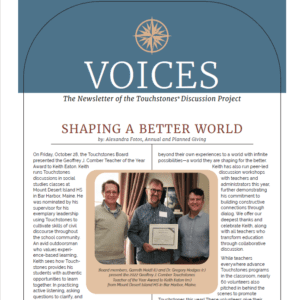By Howard Zeiderman
On Valentine’s Day, our Executive Director, who spearheads Touchstones at the Maryland Correctional Institute for Women (MCIW) was out of town. I was the substitute leader for the day, and I’ve often been into MCIW and worked with both Touchstones classes since 2015. And I’ve run Touchstones programs in men’s prisons since the 1990s. No matter how often one goes in, each visit has its own poignancy.
In prison, one confronts wasted lives and people filled with remorse. Holidays are especially difficult for prisoners, many of whom rarely or never have visitors. I remember going in for Christmas one year at the House of Corrections, where I hung coats as men lucky enough to have guests squeezed a year of parenting into four hours with their sons and daughters. At the men’s medium security facility years later, I shared in the grief felt by our group when one of their most revered fellow-prisoners—a longtime Touchstones participant and leader—was released after 37 years only to die suddenly a week later. But where does one find more absence and longing and sadness than in a women’s prison on Valentine’s Day?
Our classes at MCIW begin after lunch, so the women don’t always arrive on time. Ms. Powell’s GED class typically starts with four or five participants and reaches its typical size of eight or nine after 10 minutes. But on Valentine’s Day, there were 15 women prisoners waiting for me.
Most women in prison have suffered abuse from the men in their lives: fathers, uncles, lovers, husbands, pimps, and others they trusted or needed. The abuse starts early and tends to continue into their adult lives, as the women make unhealthy choices in intimate relations. The abuse destroys their sense of self-worth and their ability to trust.
Our Touchstones text for discussion that day was a few short sentences from the ancient thinker Heraclitus. While these remnants can be illuminating, Heraclitus himself was known as dark, gloomy, and obscure. Each of his sentences were about knowledge, understanding, and listening. I read the fragments aloud in our well-formed circle and then heard the women’s questions.
In these groups, we share our ideas from the beginning. “Why is it hard to listen?” came up many times. So that’s where I started. About 10 minutes into the discussion, a woman who had deliberately seated herself slightly back from the circle spoke. I had expected her not to participate because she had chosen to sit as she had; one learns to give people time and space to become comfortable. She brought us back to the question, saying it is hard to listen because you need first to trust. When I and others agreed that trusting one another was hard, she corrected us. “Trusting someone else is only possible,” she said, “if you trust yourself.” That insight cut through our otherwise conventional answers and resonated with the group. Now everyone was engaged in the discussion, and trust was possible. The women discussed difficult moments of distrust in oneself, without judgment—of themselves or others. And we helped each other remember times when trust in ourselves made real change possible. In reflecting on who we have been and can be, we gave ourselves and one another a valentine of hope.




 Join the
Join the